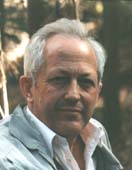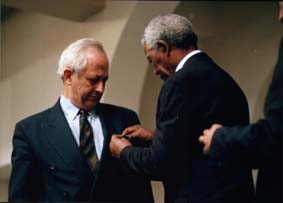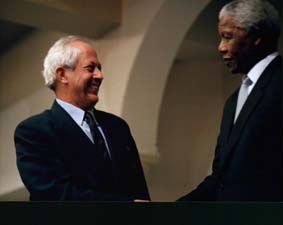Personal tools
News from ICTP 107 - Profile

World-renowned cosmologist George Ellis, who spent nearly a decade in Trieste, proves that you can go home again.
Going Home

George Ellis
When George F.R. Ellis returned
to Trieste last November to deliver the second Dennis Sciama Memorial
Lecture at the International School for Advanced Studies (SISSA),
it was a voyage back in time. In fact, Ellis--who is now professor
of applied mathematics at the University of Cape Town, South Africa,
and one of the world's leading theoretical cosmologists--spent
several years (1987-1994) at SISSA as professor of cosmic physics
during the darkest period of the apartheid regime in South Africa,
the country where he was born.
Dennis Sciama, who headed SISSA's Astrophysics Sector from 1982
to 1998, had created similar groups in England, first at Cambridge
and then Oxford, where he taught a remarkable succession of gifted
students who became eminent scientists: world-famous cosmologists
and science writers Stephen Hawking and John Barrow, the UK's
Astronomer Royal Martin Rees, and George Ellis.
"My time in Trieste was a happy time," Ellis recalls.
"Dennis had many good people in the group, including John
Miller, Antonio Lanza and Marek Abramowicz. He ran the group in
a way that maximised its energy and output--concentrating on significant
astrophysics problems, on the one hand, and the development of
promising students, on the other. We had an excellent interaction
with ICTP and I enjoined teaching students enrolled in the High
Energy Physics Diploma Course."
Ellis studied mathematics and physics at the University of Cape
Town, earning a bachelor of science degree in 1961. Three years
later he received his Ph.D. at the University of Cambridge, where
he was Sciama's first research student. At Cambridge, Ellis also
had the good fortune of collaborating with Stephen Hawking on
the development of modern mathematical approaches to general relativity.
Their partnership is described in the widely used textbook that
they co-authored: The Large-Scale Structure of Space-Time
(Cambridge University Press, 1973).
After several years as a visiting professor in the United States,
Europe and Canada, "finally," Ellis says, "in 1973
I came back to South Africa, partly for personal reasons (home
is home, after all!) and partly to see what I could do to improve
the situation here. In addition to my research, I became involved
in economic development projects and housing policy, and later
in science policy."
Ellis has published more than 200 scientific papers--most of them
focussing on general relativity theory and its application to
the large-scale structure of the universe. He has also written
eight books, not only on pure science but on science policy, economic
development issues, science education, and science and religion.
Among them: Flat and Curved Space Times; Before the Beginning;
On the Moral Nature of the Universe: Cosmology, Theology, and
Ethics (with Nancey Murphy); and Is the Universe Open or
Closed? The Density of Matter in the Universe (with Peter
Coles). In 2002, Ellis edited The Far-Future Universe. Eschatology
from a Cosmic Perceptive, a collection of 18 provocative essays
published by Templeton Foundation Press, which was based on a
symposium that took place in Rome in November 2000.
"I am still working on cosmology," Ellis says. "For
example, I have just developed a completely singularity free inflationary
universe, called the 'emergence universe.' It's a universe that
starts static in the past, then expands and becomes a standard
inflationary universe. Apart from this, I am working on understanding
the way that physics can underlie the existence of complex systems."
In 1999 Ellis was awarded the Star of South Africa Medal, presented
to him by president Nelson Mandela.


George Ellis with Nelson Mandela
He expresses high praise for his home country's peaceful transition
from apartheid to democracy. "The Mandela government was
amazing, and I think my country was truly blessed by the presence
of Nelson Mandela and Desmond Tutu at this critical time in its
history."